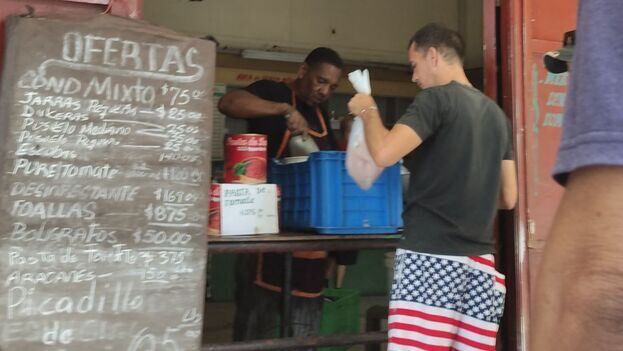
![]() 14ymedio, Madrid, 5 April 2023 — “The diet of the average Cuban household is poor in micronutrients and not sufficiently healthy or diverse due to limited and unstable availability of nutritious foods, socioeconomic factors, and poor eating habits.” The World Food Program (WFP), an arm of the United Nations, is forceful in its annual report on Cuba, which provides data that allows us to verify that the testimonies collected by 14ymedio are not anecdotal.
14ymedio, Madrid, 5 April 2023 — “The diet of the average Cuban household is poor in micronutrients and not sufficiently healthy or diverse due to limited and unstable availability of nutritious foods, socioeconomic factors, and poor eating habits.” The World Food Program (WFP), an arm of the United Nations, is forceful in its annual report on Cuba, which provides data that allows us to verify that the testimonies collected by 14ymedio are not anecdotal.
The document evaluates the current situation of the country, summarizes the aid that has been sent and reviews the challenges that the Island is facing due to the national and international crisis, as well as political decisions that it “supervises,” such as the Tarea Ordenamiento* (Ordering Task), which “still It hasn’t achieved the desired results.”
The assessment that the WFP makes of the Cuban diet could hardly be worse, especially if one takes into account that the country subsidizes or guarantees some foods, precisely with the collaboration of that organization. “Dietary diversity is limited and nutritional recommendations for all age groups are not met,” the report highlights, with a concrete example.
“The rationed food supply for the population group whose age ranges from 14 to 60 years only covers 36% of energy intake, 24% of daily protein recommendations and 18% of fat,” it says, citing an official study.
The WFP states that the consequences of malnutrition are overweight and obesity precisely because of macronutrient deficiency. According to the report, this is a growing concern for the health authorities, despite which the preparation of highly sugary and salty foods continues to be favored.
Emphasis is also placed on the inequality generated by access to foreign currency: those who do not receive remittances suffer the most from malnutrition. “The monthly minimum wage is insufficient to cover the nutritional requirements recommended for the Cuban population (2,300 kcal),” the document added. State workers and retirees are among the most affected.
The Ordering Task, which also eliminated much of the pre-existing food subsidies, takes much of the blame for the food shortage. In the opinion of the WFP, the measure contributed to boosting inflation above expectations – 40% year-on-year from October 2021 to October 2022, which currently already exceeds 44% and in the food sector is greater than 70%. The result of this is greater vulnerability.
“As a result, the country experienced food shortages, including the main cereals (wheat flour, rice and corn), beans, vegetables, dairy products and meat (beef and pork),” adds the text, which specifies that Cuban households spend between 55% and 65% of their income on food, a disproportionate percentage.

Despite this, the report is not particularly hard on the government and considers that the situation could be even worse. “Cuba was ranked 83rd with a score of 0.764 in the 2021-2022 Human Development Report, above most Latin American countries, due to the country’s social protection programs and universal access to basic services. In addition, it praises the extensive vaccination coverage against covid-19 with the nationally produced vaccines, although the endorsement of the World Health Organization (WHO) is still not forthcoming.
To alleviate the food security problems that the Island suffers, the WFP collaborates with the authorities. In 2022, the agency bought $10.7 million in rice, oil, flour, cereals, corn and soy mix, as well as other powdered foods with macronutrients, including milk, after discovering in data from the National Institute of Hygiene , Epidemiology and Microbiology that there was a high prevalence of anemia among babies from 6 to 23 months of age in Havana and other central provinces. Thus, it was decided to expand the coverage, which was also planned for the eastern zone at the request of the Cuban Government.
The WFP served a total of 10% more people than in 2021, a total of 789,068 beneficiaries, 56% of whom were women.
*Translator’s note: The “Ordering Task” [Tarea Ordenamiento] is a collection of measures that include eliminating the Cuban Convertible Peso (CUC), leaving the Cuban peso as the only national currency, raising prices, raising salaries (but not as much as prices), opening stores that take payment only in hard currency which must be in the form of specially issued pre-paid debit cards, and a broad range of other measures targeted to different elements of the Cuban economy.
____________
COLLABORATE WITH OUR WORK: The 14ymedio team is committed to practicing serious journalism that reflects Cuba’s reality in all its depth. Thank you for joining us on this long journey. We invite you to continue supporting us by becoming a member of 14ymedio now. Together we can continue transforming journalism in Cuba.
